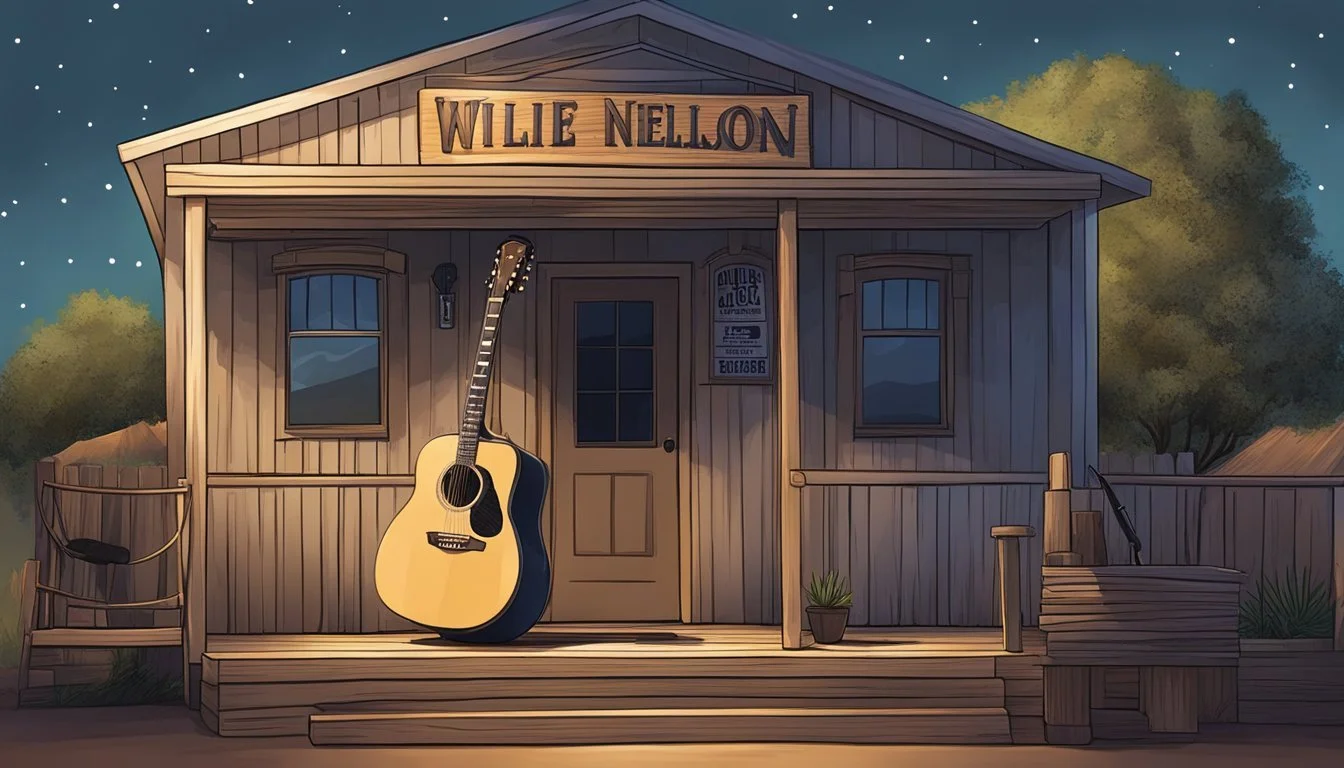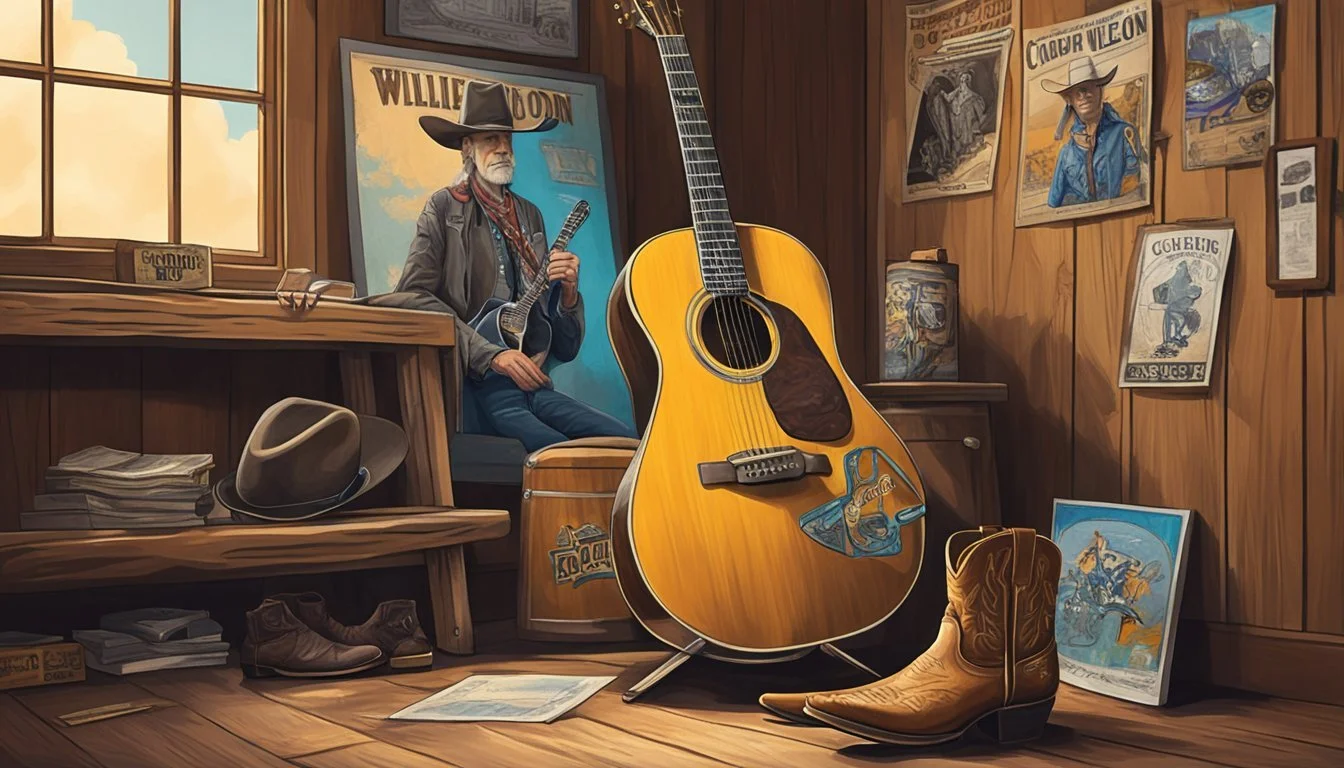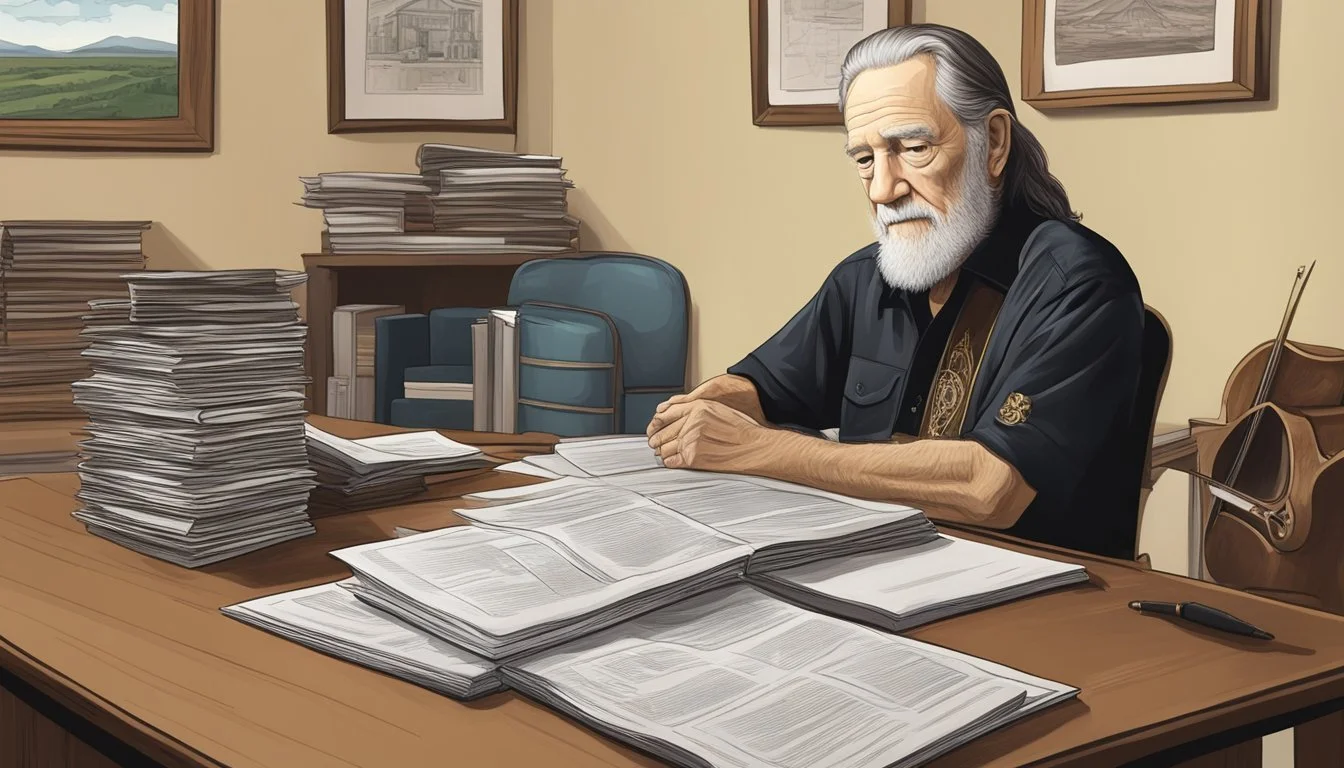Uncovering the Roots: When Was Willie Nelson Born? The Story Behind a Country Legend!
Willie Nelson, an iconic figure in country music, has captivated audiences for decades with his distinctive voice and songwriting prowess. Born on April 29, 1933, in Abbott, Texas, Nelson emerged as a musical prodigy from an early age. His humble beginnings during the Great Depression shaped his unique perspective and laid the foundation for his illustrious career.
Nelson's journey in the music industry began in his childhood, learning to play guitar from his grandfather. By the age of 10, he was already performing at local dances, showcasing his natural talent and affinity for music. This early start paved the way for his future success as a songwriter and performer.
Throughout his career, Willie Nelson has become more than just a musician. He's a cultural icon, known for his activism and involvement in organizations like Farm Aid and NORML. His impact on country music and American culture at large is undeniable, making him a fascinating subject for music enthusiasts and historians alike.
Early Life and Background
Willie Nelson's journey began in rural Texas during the Great Depression. His early years shaped his musical path and laid the foundation for his iconic career.
Birth and Family
Willie Hugh Nelson was born on April 29, 1933, in Abbott, Texas. His parents were Myrle Marie Greenhaw and Ira Doyle Nelson. Willie and his older sister Bobbie were raised by their paternal grandparents during the challenging times of the Great Depression.
The small town of Abbott provided a humble backdrop for Willie's childhood. His family faced economic hardships common to many during that era. These experiences would later influence his songwriting and musical style.
Musical Roots and Influences
Willie's musical journey began at a remarkably young age. His grandfather bought him his first guitar when he was six years old and taught him the basics of playing. By age seven, Willie was already writing his own songs.
Country music legend Bob Wills significantly influenced young Willie's musical tastes. Willie admired Wills' blend of country, jazz, and blues. This eclectic mix would later shape Nelson's unique sound.
Local dance halls and honky-tonks exposed Willie to various musical styles. He absorbed these influences, developing his distinctive voice and guitar-playing technique.
Education and Early Bands
Willie attended Abbott High School, where he further honed his musical skills. He played in the school band and participated in local talent shows. These experiences helped build his confidence as a performer.
At 13, Willie joined his first band, Bud Fletcher and the Texans. This group, which included his sister Bobbie on piano, played in local venues and gave Willie valuable stage experience.
After high school, Willie briefly attended Baylor University. However, his passion for music soon led him to leave formal education and pursue a career in the industry full-time.
Rise to Fame
Willie Nelson's journey to stardom began in Nashville, where his songwriting talents caught the attention of industry professionals. His breakthrough as a songwriter paved the way for his own recording career and eventual iconic status in country music.
Initial Steps in Nashville
Willie Nelson moved to Nashville in 1960 to pursue his music career. He quickly found work as a songwriter, penning hits for established artists. His unique style and evocative lyrics set him apart in the competitive Nashville scene.
Nelson's early years in Music City were marked by hard work and persistence. He played in local clubs and pitched his songs to publishers and record labels. Despite facing initial rejections, Nelson's talent gradually gained recognition among industry insiders.
Breakthrough Songwriting
Nelson's big break came with the song "Hello Walls," recorded by Faron Young in 1961. The track became a massive hit, topping the country charts for nine weeks. This success established Nelson as a sought-after songwriter in Nashville.
Another significant milestone was "Crazy," recorded by Patsy Cline in 1962. The song became one of her signature hits and cemented Nelson's reputation as a masterful songwriter. His ability to craft emotionally resonant lyrics with memorable melodies caught the attention of major artists and producers.
First Record Deals
Nelson's songwriting success led to his first recording contract with Liberty Records in 1962. He released several singles and albums, including "Touch Me" and "...And Then I Wrote." While these early recordings showcased his talent, they didn't achieve widespread commercial success.
In 1964, Nelson signed with RCA Victor. This period saw him release songs like "Pretty Paper" and "One Day at a Time." Although he gained some recognition as a performer, his biggest impact was still as a songwriter for other artists.
Nelson's work with Ray Price during this time further expanded his influence in the country music scene. Their collaboration helped shape the "Nashville Sound" and broadened Nelson's artistic horizons.
Chart-Topping Success
Willie Nelson's rise to stardom was marked by a series of hit albums and singles that dominated the charts. His unique style and captivating songwriting propelled him to the forefront of country music and beyond.
Red Headed Stranger
Nelson's breakthrough album, "Red Headed Stranger," released in 1975, became a critical and commercial success. The concept album told a cohesive story through its songs, a novel approach at the time. Its stripped-down sound contrasted sharply with the polished Nashville productions of the era.
The title track and "Blue Eyes Crying in the Rain" became major hits. "Blue Eyes Crying in the Rain" reached No. 1 on the Billboard Hot Country Singles chart and earned Nelson his first Grammy Award for Best Male Country Vocal Performance.
Stardust and Genre-Crossing
In 1978, Nelson released "Stardust," a collection of pop standards. The album showcased his versatility and ability to cross genre boundaries. It spent two years on the Billboard Top Country Albums chart and went platinum multiple times.
"Stardust" yielded several hit singles, including "Georgia on My Mind" and "All of Me." The album's success demonstrated Nelson's appeal beyond traditional country audiences and solidified his status as a crossover artist.
1980s and Outlaw Country Movement
Nelson's chart dominance continued into the 1980s. His 1982 album "Always on My Mind" topped both country and pop charts. The title track became one of his signature songs and won three Grammy Awards.
As a key figure in the Outlaw Country movement, Nelson collaborated with other artists, expanding his reach. His duets with Waylon Jennings, like "Mammas Don't Let Your Babies Grow Up to Be Cowboys," became chart-toppers.
Nelson's earlier album "Shotgun Willie" (1973) had laid the groundwork for his success and helped define the Outlaw Country sound. Throughout the decade, he consistently produced hit singles and albums, cementing his legendary status in country music.
Music Career Evolution
Willie Nelson's musical journey spans decades, marked by innovative songwriting, genre-blending albums, and iconic collaborations. His evolving artistry has left an indelible mark on country music and beyond.
Albums and Collaborations
Nelson's discography showcases his versatility and willingness to experiment. His breakthrough album "Red Headed Stranger" (1975) revolutionized country music with its stripped-down sound. He followed this with diverse projects, including the jazz-influenced "Stardust" (1978).
Nelson's collaborative spirit led to memorable duets with artists across genres. He recorded with Waylon Jennings, Merle Haggard, and Julio Iglesias, among others. These partnerships resulted in hit songs and critically acclaimed albums.
His ability to cross musical boundaries earned him numerous accolades, including multiple Grammy Awards. Nelson's distinctive voice and unconventional phrasing became his trademark, setting him apart in the industry.
The Highwaymen
In 1985, Nelson formed The Highwaymen supergroup with Johnny Cash, Waylon Jennings, and Kris Kristofferson. This collaboration united four of country music's most influential artists.
The group released three studio albums and embarked on several successful tours. Their self-titled debut album spawned the hit single "Highwayman," which topped the country charts.
The Highwaymen represented a blend of outlaw country and traditional storytelling. Their work further cemented Nelson's status as a pivotal figure in country music history.
Return to Songwriting
After focusing on interpretations of classics, Nelson returned to prolific songwriting in his later career. His 2014 album "Band of Brothers" featured mostly original material, showcasing his enduring creativity.
Nelson continued to release new music regularly, often tackling contemporary themes. His songwriting remained sharp and relevant, addressing topics like politics and environmental issues.
This period also saw Nelson exploring different musical styles, from reggae to blues. His willingness to evolve and adapt his sound kept his music fresh and engaging for new generations of listeners.
Artistry and Musical Style
Willie Nelson's unique musical approach blends country, folk, jazz, and pop influences. His distinctive guitar playing and vocal style, combined with his genre-bending songwriting, have left an indelible mark on American music.
Guitar Playing and Vocal Style
Nelson's guitar playing is instantly recognizable. He favors a nylon-string acoustic guitar named "Trigger," which he's played since 1969. His guitar style incorporates elements of jazz, particularly influenced by Django Reinhardt, with unconventional timing and phrasing. Nelson's fingerpicking technique and melodic solos are hallmarks of his sound.
His vocal style is equally distinctive. Nelson's nasal tone and relaxed, behind-the-beat phrasing give his vocals a conversational quality. He often employs talk-singing and unexpected melodic choices, making even well-known songs sound fresh and personal.
Genre Influence and Legacy
Nelson's music defies easy categorization. While rooted in country, he incorporates elements of jazz, folk, and pop. This genre-blending approach helped pioneer the "outlaw country" movement of the 1970s, which rebelled against the polished Nashville sound.
His songwriting has influenced countless artists across genres. Nelson's compositions, like "Crazy" and "On the Road Again," have become American standards. He's collaborated with diverse artists, from Hank Williams to Frank Sinatra, bridging musical gaps.
Nelson's legacy extends beyond his music. His activism, particularly for farm aid and marijuana legalization, has made him a cultural icon. His longevity and continued relevance in the music industry serve as inspiration for new generations of artists.
Acting and Media Appearances
Willie Nelson has graced both the big and small screens with his distinctive presence. His acting career spans several decades, featuring roles in major films and television shows.
Film Career Highlights
Willie Nelson made his acting debut in the 1979 film "The Electric Horseman," starring alongside Robert Redford and Jane Fonda. This role marked the beginning of his journey into feature films. Nelson went on to appear in "Honeysuckle Rose" (1980), a musical drama where he played the lead role of Buck Bonham.
In 2005, Nelson took on the part of Uncle Jesse in the film adaptation of "The Dukes of Hazzard." His performance added a touch of country charm to the action-comedy. Nelson's filmography also includes a role in the 2007 comedy "Blonde Ambition," featuring Jessica Simpson.
Cameo Roles and Television
Nelson's acting repertoire extends beyond leading roles to include memorable cameo appearances. In 2016, he made a brief but notable appearance in "Zoolander 2," the sequel to the popular comedy starring Ben Stiller.
On television, Nelson has made numerous guest appearances on various shows. He has played himself in several series, bringing his authentic persona to the small screen. These cameos often showcase his musical talents alongside his acting abilities.
Nelson's television work also includes hosting duties and performances on music-focused programs. His distinctive voice and iconic status have made him a sought-after guest on talk shows and music specials throughout his career.
Personal Life and Activism
Willie Nelson's life extends far beyond his musical career, encompassing a rich tapestry of family relationships and passionate advocacy for various causes. His personal experiences and beliefs have shaped his role as both a cultural icon and an influential activist.
Family and Relationships
Willie Nelson has been married four times and has seven children. His first marriage to Martha Matthews lasted from 1952 to 1962 and produced three children. He wed Shirley Collie in 1963, but they divorced in 1971. His third marriage to Connie Koepke lasted from 1971 to 1988, resulting in two daughters. In 1991, Nelson married his current wife, Annie D'Angelo, with whom he has two sons.
Nelson's family life has been a source of inspiration for his music. His song "Family Bible" was inspired by his childhood memories. Despite the challenges of balancing fame with family, Nelson has maintained close relationships with his children and grandchildren.
Advocacy and Philanthropy
Willie Nelson is known for his tireless activism and philanthropic efforts. He co-founded Farm Aid in 1985, an organization that supports family farmers and promotes sustainable agriculture. The annual Farm Aid concert has raised millions of dollars for its cause.
Nelson is a vocal advocate for environmental causes and the legalization of marijuana. He serves on the advisory board of NORML (National Organization for the Reform of Marijuana Laws) and has been arrested multiple times for cannabis possession. His support extends to biodiesel fuel and sustainable energy sources.
In addition to his environmental work, Nelson has supported various charitable organizations. He has raised funds for disaster relief efforts and veterans' causes. His activism reflects his commitment to social justice and his desire to use his platform for positive change.
Legal Issues and Business Ventures
Willie Nelson has faced significant financial challenges and explored diverse business opportunities throughout his career. His experiences highlight both setbacks and entrepreneurial spirit.
IRS Troubles and Auction
In 1990, the Internal Revenue Service (IRS) seized Willie Nelson's assets due to $16.7 million in unpaid taxes. This action resulted from years of financial mismanagement and questionable tax shelter investments. The IRS took possession of Nelson's property, including his gold records and musical equipment.
To settle his debt, Nelson released a unique album titled "The IRS Tapes: Who'll Buy My Memories?" Profits from this record went directly to the IRS. Friends and fans also rallied to support Nelson, purchasing his seized belongings at auction and later returning them to him.
Nelson ultimately negotiated a settlement with the IRS in 1993, agreeing to pay $9 million to resolve his tax issues.
Entrepreneurship in Biofuels
In 2004, Willie Nelson ventured into the biofuel industry by co-founding Willie Nelson Biodiesel. This company produced biodiesel fuel, marketed as "BioWillie," made from vegetable and cooking oils.
Nelson's interest in biofuels stemmed from his desire to support American farmers and reduce dependency on foreign oil. The company initially showed promise, supplying fuel to truckers and farmers across several states.
However, the venture faced challenges due to fluctuating oil prices and production costs. Despite these difficulties, Nelson's foray into biofuels demonstrated his commitment to environmental causes and rural economic development.
Awards and Recognitions
Willie Nelson has received numerous accolades throughout his illustrious career, recognizing his contributions to music and agriculture. His impact spans multiple genres and extends beyond the realm of entertainment.
Hall of Fame Inductions
Willie Nelson was inducted into the Country Music Hall of Fame in 1993, cementing his status as a country music legend. This honor acknowledges his influential songwriting and distinctive vocal style. In 1973, Nelson entered the Nashville Songwriters Hall of Fame, highlighting his prolific songwriting career.
The National Agricultural Hall of Fame welcomed Nelson in 2011. This induction recognizes his advocacy for farmers and his role in organizing Farm Aid concerts since 1985.
Lifetime Achievement and Honors
In 2015, Nelson received the Library of Congress Gershwin Prize for Popular Song. This prestigious award celebrates his lifetime contributions to popular music and American culture.
The Country Music Association established the Willie Nelson Lifetime Achievement Award in 2012, naming Nelson as its first recipient. This honor recognizes artists who have attained the highest degree of recognition in country music.
Nelson's Grammy Awards include a Lifetime Achievement Award in 2000. He has won 12 competitive Grammy Awards from 53 nominations, spanning country, pop, and jazz categories.
Tributes and Legacy
Willie Nelson's profound impact on country music and American culture has inspired countless tributes and cemented his enduring legacy. His distinctive sound and songwriting style continue to influence artists across genres.
Artistic Impact
Willie Nelson's unique vocal style and guitar playing have left an indelible mark on country music. His blend of outlaw country, jazz, and folk elements created a signature sound that many have tried to emulate. Nelson's songwriting prowess has earned him admiration from peers and critics alike. His influence extends beyond country, touching rock, pop, and Americana artists. Nelson's work helped establish Austin, Texas as a music hub, contributing to its reputation as the "Live Music Capital of the World."
Tribute Performances and Covers
Numerous artists have paid homage to Willie Nelson through performances and cover versions of his songs. His classic "On the Road Again" has been performed by diverse acts, from Alison Krauss to Phish. The Grand Ole Opry, where Nelson was once a member, regularly features tributes to his music. Many country stars have recorded entire albums of Nelson covers, showcasing the breadth of his catalog. Tribute concerts celebrating Nelson's birthday or career milestones often draw A-list performers from various genres, highlighting his cross-generational appeal.
Discography and Musical Works
Willie Nelson has released an astounding 102 studio albums over his lengthy career. This includes 76 solo albums and 26 collaborative works with other artists.
Some of his most acclaimed albums include:
Shotgun Willie (1973)
Red Headed Stranger (1975)
Stardust (1978)
Nelson's songwriting career began in the 1950s. He penned hits for other artists while working at Pamper Music in Nashville. His compositions like "Crazy" became major successes for performers such as Patsy Cline.
In the 1970s, Nelson helped pioneer the outlaw country movement. This subgenre rebelled against the polished Nashville sound dominating country music at the time.
"On the Road Again" stands as one of Nelson's signature songs. Released in 1980, it earned him a Grammy Award and became an enduring anthem of life on tour.
Nelson's discography spans multiple decades and styles. He's recorded country, jazz standards, reggae, and even released a Frank Sinatra tribute album. This versatility showcases his range as both a vocalist and guitarist.













